Heat pump water heaters (HPWH) are electric appliances that heat water by absorbing heat from the air and moving it into a storage tank, as opposed to generating heat through burning fossil fuels or resistance heating.
A heat pump water heater is very much like a refrigerator running in reverse: instead of pushing heat out of the inside of the refrigerator into its surroundings, a heat pump water heater absorbs heat from surrounding air to heat water.
Since it takes far less energy to move heat than it does to create heat, heat pump water heaters are much more efficient than conventional water heaters: heat pump water heaters offer 250-300+% water heating efficiency compared to 60-70% for fossil fuel storage water heaters and 90-95% for traditional electric water heaters.
Heat pump water heaters heat water slowly over the course of the day and typically have a backup electric heating element to help speed up water heating during periods of high hot water demand.

 Heat Pump Water Heater Options
Heat Pump Water Heater OptionsHeatSmart CNY installers are offering a few sizes of heat pump water heaters depending on your building’s hot water demand.
In general, 50-gallon heat pump water heaters are well-suited for households of 2-3 occupants.
Households with 4 or more occupants will typically need a 80-gallon heat pump water heater.